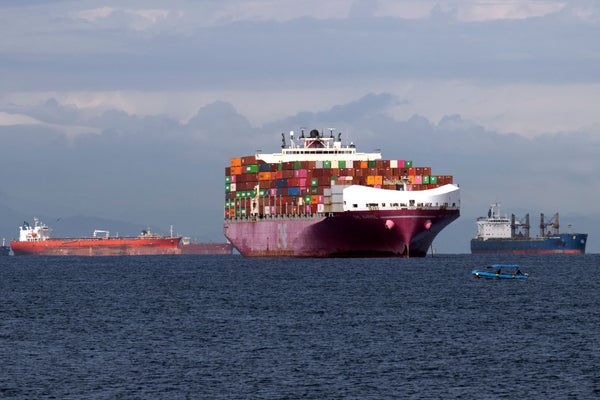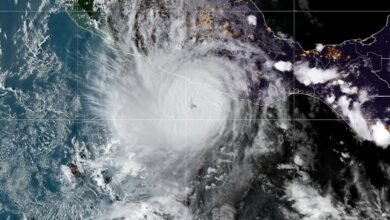
August 14, 2024
3 min read
Cleaned Up Shipping Emissions Have Revealed Additional Global Warming
New shipping regulations set limits on sulfur in maritime fuel, reducing harmful pollution but inadvertently ceasing a cooling effect on Earth’s climate

Cargo ships at the entrance of the Panama Canal on September 24, 2023.
Luis Acosta/AFP via Getty Images
CLIMATEWIRE | Efforts to cut air pollution on the high seas may have led to an unintended side effect — speeding up global warming.
That’s according to a study published Monday in the scientific journal Geophysical Research Letters.
The authors looked at environmental regulations, introduced in 2020 by the International Maritime Organization, that sought to reduce the amount of sulfur pumped out by ships worldwide.
On supporting science journalism
If you’re enjoying this article, consider supporting our award-winning journalism by subscribing. By purchasing a subscription you are helping to ensure the future of impactful stories about the discoveries and ideas shaping our world today.
They found the rules may have inadvertently raised global temperatures by as much as 0.04 degree Celsius, or about 0.07 degree Fahrenheit, since 2020 because of the way sulfur helps clouds cool the Earth.
The temperature increase estimated by the scientists is about 17 percent of the warming caused by greenhouse gas emissions over the last few years, the paper notes. That would make the new rules a hefty contributor to recent rising temperatures — including the staggering global heat run of 2023, which went down in history as the hottest year on record.
And there’s more warming coming down the pipeline, the researchers warn.
They suggest that temperatures may rise by another 0.03 degree Celsius or more because of the new shipping rules. As a result, the new regulations “can be seen as an inadvertent experiment in solar geoengineering, but in reverse,” the new study says.
On its face, the concept may sound counterintuitive. Pollution regulations are intended to protect the planet and safeguard human health. So how could they be nudging global temperatures skyward?
The answer is rooted in physics, scientists say. Certain types of air pollution particles help clouds form faster and glow brighter, reflecting sunlight away from the Earth and cooling the atmosphere in the process.
Sulfur particles are some of the best cloud fuel around. They also happen to be a major component of shipping pollution — that’s why ships often leave bright tracks in the air behind them as they move through the sea.
The 2020 IMO regulations set new limits for the sulfur content in ships’ fuel in an effort to reduce harmful air pollution. But in doing so they also removed a powerful cloud-seeding element from the atmosphere. So with fewer clouds reflecting sunlight away from the Earth, global temperatures can rise even faster.
That means the environmental regulations aren’t heating the planet by themselves — global warming is still caused by human emissions of greenhouse gases. But the new rules are removing an element that helped mask some of that warming until recently, causing temperatures to temporarily spike even faster.
“Cleaning up air quality faster than limiting greenhouse gas emissions may be accelerating climate change,” said lead study author Andrew Gettelman, a scientist at Pacific Northwest National Laboratory, in a statement.
It’s not the first study to raise the alarm. Other research groups have suggested the 2020 regulations have had a powerful effect on cloud cover, especially in parts of the world with heavy ship traffic. These reductions could translate into major gains in global heat.
A study published in June, for instance, suggested the new shipping regulations could induce as much as 0.16 degree Celsius of additional warming over the course of just seven years — effectively doubling the planet’s average warming rate from the last century.
But the exact numbers are up for debate. The June study projected more than twice the additional warming implied by the new study. And scientists not involved with the research warned its results might be overstated.
The new paper suggests less warming in response to the shipping regulations — but it also acknowledges there’s a lot of scientific uncertainty around the figures. Additional research is needed, informed by more data on ship tracks and cloud physics around the world.
Still, studies increasingly suggest that pollution regulations can have a substantial impact on the rate of global warming — even if the exact temperature response is up for debate. That means scientists should account for their impacts when making projections about future warming, researchers say.
“As the world rapidly decarbonizes and dials down all anthropogenic emissions, sulfur included, it will become increasingly important to understand just what the magnitude of the climate response could be,” Gettelman said in a statement. “Some changes could come quite quickly.”
Reprinted from E&E News with permission from POLITICO, LLC. Copyright 2024. E&E News provides essential news for energy and environment professionals.
Source link







